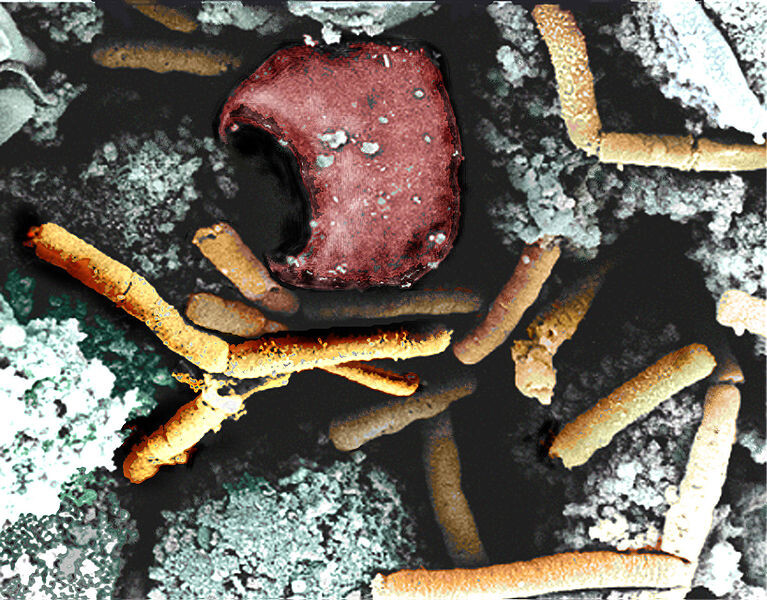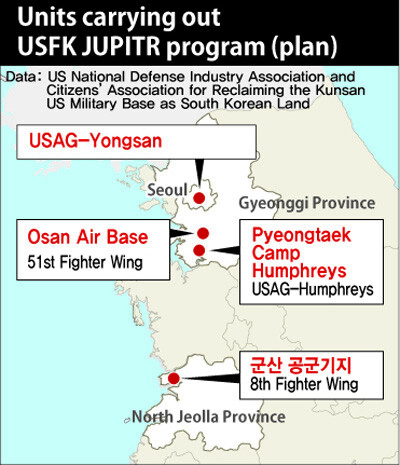hankyoreh
Links to other country sites 다른 나라 사이트 링크
US may have been testing anthrax at two other bases in South Korea

Allegations are surfacing that United States Forces Korea (USFK) anthrax testing has been conducted at bases in Gunsan, North Jeolla, and Pyeongtaek, Gyeonggi Province.
USFK is currently facing criticisms after an episode last month in which a live anthrax sample was delivered for testing at Osan Air Base in Gyeonggi Province.
The anthrax tests are part of USFK’s Joint United States Forces Korea Portal and Integrated Threat Recognition (JUPITR) program. New revelations show that USFK laboratories running the program exist not only at Osan and Yongsan Garrison in Seoul, but also in Gunsan and Pyeongtaek.
The group Citizens’ Association for Reclaiming the Kunsan US Military Base as South Korean Land revealed the findings at a press conference on June 17 in front of Kunsan Air Base.

The association also called for the US to “immediately stop its biological and chemical warfare response training and close its biological agent research centers.”
The US National Defense Industry Association (NDIA) quotes US Army Joint Program Executive Office for Chemical and Biological Defense (JPEO-CBD) deputy chief of staff Daniel McCormick as listing four locations of USFK JUPITR program laboratories during a May 7 forum on chemical and biological warfare response capabilities. In addition to Yongsan Garrison and Osan Air Base, the list also included Camp Humphreys in Pyeongtaek and Kunsan Air Base.
JPEO-CBD operates the JUPTR program through USFK as a component of the US military’s global strategy on chemical and biological defense and as a response to the North Korean biological and chemical weapons threat.
Previous data released by NDIA in 2013 mentioned Yongsan and Osan as housing JUPITR program laboratories, with testing on anthrax and botulinum, as well as three environmental laboratories at unspecified located under the US Army Public Health Command.
The new information raises the number of USFK bases where the JUPITR program is being carried out to four, raising questions over whether the program has been expanded in the past two years as a measure against possible biological or chemical warfare in Korea.
In late May, USFK was conducting experiments for the JUPITR program at Osan Air Base with anthrax samples brought into South Korea by FedEx. On May 27, it received notification that the sample was live, prompting it to carrying out an immediate shutdown, it reported.
Anthrax is considered one of the leading bacterial agents in biological weapons. A low-altitude release of 100 kg in a large city would be enough to kill one to three million people.
Despite the criticisms from civic groups, the USFK has maintained the official position that it will not answer questions about the anthrax delivery case until the investigation is over.
By Kim Ji-hoon, staff reporter
Please direct questions or comments to [english@hani.co.kr]

Editorial・opinion
![[Guest essay] The real reason Korea’s new right wants to dub Rhee a founding father [Guest essay] The real reason Korea’s new right wants to dub Rhee a founding father](https://flexible.img.hani.co.kr/flexible/normal/500/300/imgdb/original/2024/0423/8317138574257878.jpg) [Guest essay] The real reason Korea’s new right wants to dub Rhee a founding father
[Guest essay] The real reason Korea’s new right wants to dub Rhee a founding father![[Column] ‘Choson’: Is it time we start referring to N. Korea in its own terms? [Column] ‘Choson’: Is it time we start referring to N. Korea in its own terms?](https://flexible.img.hani.co.kr/flexible/normal/500/300/imgdb/original/2024/0423/3617138579390322.jpg) [Column] ‘Choson’: Is it time we start referring to N. Korea in its own terms?
[Column] ‘Choson’: Is it time we start referring to N. Korea in its own terms?- [Editorial] Japan’s rewriting of history with Korea has gone too far
- [Column] The president’s questionable capacity for dialogue
- [Column] Are chaebol firms just pizza pies for families to divvy up as they please?
- [Column] Has Korea, too, crossed the Rubicon on China?
- [Correspondent’s column] In Japan’s alliance with US, echoes of its past alliances with UK
- [Editorial] Does Yoon think the Korean public is wrong?
- [Editorial] As it bolsters its alliance with US, Japan must be accountable for past
- [Guest essay] Amending the Constitution is Yoon’s key to leaving office in public’s good graces
Most viewed articles
- 1[Column] ‘Choson’: Is it time we start referring to N. Korea in its own terms?
- 2Why Korea shouldn’t welcome Japan’s newly beefed up defense cooperation with US
- 3Senior doctors cut hours, prepare to resign as government refuses to scrap medical reform plan
- 4[Guest essay] The real reason Korea’s new right wants to dub Rhee a founding father
- 5Samsung barricades office as unionized workers strike for better conditions
- 6Opposition calls Yoon’s chief of staff appointment a ‘slap in the face’
- 7[Column] The clock is ticking for Korea’s first lady
- 8[Editorial] Japan’s rewriting of history with Korea has gone too far
- 9New AI-based translation tools make their way into everyday life in Korea
- 10Terry Anderson, AP reporter who informed world of massacre in Gwangju, dies at 76